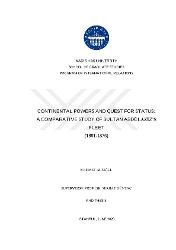| dc.contributor.advisor | Güvenç, Serhat | en_US |
| dc.contributor.author | Alioğlu, Mehmet | |
| dc.date.accessioned | 2021-02-16T16:18:04Z | |
| dc.date.available | 2021-02-16T16:18:04Z | |
| dc.date.issued | 2020 | |
| dc.identifier.uri | https://hdl.handle.net/20.500.12469/3935 | |
| dc.description.abstract | In this study, the Ottoman Fleet during the reign of Sultan Abdülaziz is taken as a case that stands out as a Nineteenth Century precursor to subsequent efforts by continental powers, Kaiser Wilhelm II's Germany and Stalin's USSR, to build sub-optimal fleets in the Twentieth Century. Therefore, these two cases are added in order to answer the following question: why do continental powers establish or try to acquire naval power beyond levels needed for the physical security of the state? In the first chapter, the purpose, the scope, and the methodology are presented. In the second chapter, the theoretical framework of the study is established and why a Constructivist theoretical framework is preferred over a Realist one is explained. The third chapter is devoted to the study of Ottoman sea power from historical and theoretical perspectives. As a result, the Ottoman Empire is identified as a continental power. In the fourth chapter, the strategic needs of the Ottoman Empire are studied to identify physical threats to the state from a historical perspective. The fifth chapter covers the fleet of Sultan Abdülaziz and its evaluation against potential threats. The inquiry made shows that Sultan Abdülaziz's Fleet was not commensurate with the threats it was supposed to counter. Therefore, it was an irrational arming decision. As a result, it is studied from a struggle for recognition perspective which fits in with the Ottoman naval expansion during the reign of Sultan Abdülaziz. In the sixth and seventh chapters, the German and the Soviet naval expansions are evaluated against the threats these states faced. As a result, the German and Soviet fleets during the reigns of Kaiser Wilhelm II and Joseph Stalin are identified as inappropriate tools against the physical threats they were supposed to counter. They instead fit better in a struggle for recognition perspective. Then Ottoman, German, and Soviet naval expansions are comparatively evaluated to answer the question of why continental powers establish or try to acquire naval power beyond levels needed for the physical security of the state. In this context this study concludes that all three states tried to acquire status through naval power. Hence, Constructivism offers a better explanation of continental states' over-investments in naval power. | en_US |
| dc.description.abstract | Bu çalışmada neden karasal devletler fiziksel güvenlik gereklerinin ötesinde bahriye kurmaya çalışırlar sorusu Sultan Abdülaziz Donanması örneği üzerinden incelenmiştir. Bu çaba 20. yüzyılda Wilhelm Almanyası ile Stalin dönemi Sovyetler Birliği'nin giriştiği büyük donanma kurma çabalarının bir öncüsüdür. Dolayısıyla bu iki örnek karşılaştırma amacıyla teze dahil edilmiştir. Bu doğrultuda 1. Bölümde tezin amaç, kapsam, ve yöntemi ayrıntılı olarak tanımlanmıştır. 2. Bölümde tezin kuramsal çerçevesi İnşaacı bir kuram tercih edilerek oluşturulmuş ve bunun gerekçeleri belirtilmiştir. 3. Bölümde Osmanlı deniz gücü tarihsel ve kuramsal bileşenler üzerinden incelenmiş ve Osmanlı Devleti'nin karasal bir devlet olduğu sonucuna varılmıştır. 4. Bölümde Sultan Abdülaziz döneminde devletin karşı karşıya olduğu tehditler ve devletin stratejik ihtiyaçları tarihsel perspektiften değerlendirilmiştir. 5. Bölüm Sultan Abdülaziz'in donanması, bu donanmanın potansiyel tehditlerle kıyaslanması ve bu tehditlere karşı performansının incelenmesine ayrılmıştır. Bu bağlamda donanmanın devletin stratejik ihtiyaçlarına hitap etmediği sonucuna ulaşılmış ve bu silahlanmanın rasyonel olmadığı görülmüştür. Dolayısıyla donanmanın statü kazanmak amacı ile oluşturulduğu görülmüştür. 6. ve 7. Bölümlerde Alman ve Sovyetler Birliği donanma yatırımları incelenmiştir. Bu donanma atılımlarının da devletlerin fiziksel güvenlik ihtiyaçlarına ve tehditlere uygun olmadığı sonucuna ulaşılmıştır. Bu hamlelerin de Osmanlı Devleti örneğinde olduğu gibi statü kazanmak amacıyla yapıldığı sonucuna varılmıştır. Sonrasında Osmanlı, Alman, ve Sovyet donanma hamleleri karşılaştırılarak neden karasal devletler fiziksel güvenlik ihtiyaçlarının ötesinde donanma gücü elde ederler sorusuna yanıt aranmıştır. Bu bağlamda üç devletin de büyük donanma kurmalarının arkasındaki amacın deniz gücü üzerinden uluslararası statü kazanmak olduğu saptanmıştır. | en_US] |
| dc.language.iso | eng | en_US |
| dc.publisher | Kadir Has Üniversitesi | en_US |
| dc.rights | info:eu-repo/semantics/openAccess | en_US |
| dc.subject | N/A | en_US |
| dc.title | Continental powers and quest for status: A comparative study of Sultan Abdülaziz's fleet (1861-1876) | en_US |
| dc.title.alternative | Kara devletleri ve statü arayışı: Abdülaziz donanmasına ait karşılaştırmalı bir çalışma (1861-1876) | en_US |
| dc.type | doctoralThesis | en_US |
| dc.department | Enstitüler, Lisansüstü Eğitim Enstitüsü, Uluslararası İlişkiler Ana Bilim Dalı | en_US |
| dc.institutionauthor | Alioğlu, Mehmet | en_US |
| dc.relation.publicationcategory | Tez | en_US |
| dc.identifier.yoktezid | 649317 | en_US |
















